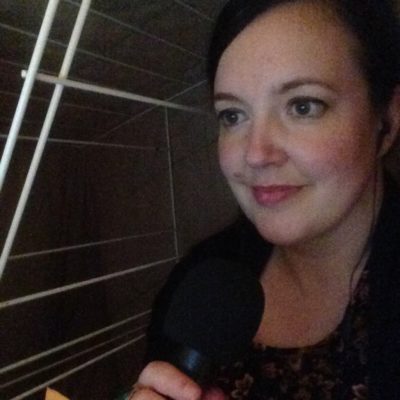| 00:00
|
Music: |
[Piano Overlaid With Distorted Beat] |
| 00:10 |
Hannah McGregor: |
Welcome to the SpokenWeb ShortCuts. Each month on alternate fortnights (that’s every second week following the monthly SpokenWeb Podcast episode) join me, Hannah McGregor and our minisode host and curator, Katherine McLeod for SpokenWeb’s ShortCuts mini-series. |
| 00:25 |
Hannah McGregor: |
We’ll share with you specially curated audio clips from deep in the SpokenWeb archives to ask: what does it mean to cut and splice digitally? What kinds of new stories and audio criticism can be produced through these short archival clips? An extension of the ShortCuts blog posts [Sound Effect: Wind Chime] on SpokenWeb blog, this series brings Katherine’s favorite audio clips each month to the SpokenWeb Podcast feed. So if you love what you hear, make sure to head over to spokenweb.ca for more. [End Music: Instrumental Electronic] Without further ado, here is Katherine McLeod with SpokenWeb ShortCuts: mini stories about how literature sounds.
|
| 01:12 |
Theme Music: |
[Instrumental Overlapped With Feminine Vocals]
|
| 01:19 |
Katherine McLeod: |
Welcome to ShortCuts: short stories about how literature sounds. Our shortcut this month is an archival recording that manages to transport us into the feeling of being at a live poetry reading.
|
| 01:34 |
Audio Recording, Muriel Rukeyser Reading [Unknown Speaker] :
|
I now introduce Muriel Rukeyser [Applause].
|
| 01:44 |
Katherine McLeod: |
This is a feeling that many of us are craving right now in November 2020 as the pandemic and social distancing continue. To be in a crowded room listening to poetry. [ Audio Recording of Muriel Rukeyser Begins] But what is it that we are really missing about that experience? The poetry? The poet? The anticipation of the event? The shared experience of attending? The hum of the room? The unknown? Poet Muriel Rukeyser puts it beautifully and inquisitively when she says that we go to poetry readings —
|
| 02:22 |
Audio Recording, Muriel Rukeyser: |
All right. It’s partly out of curiosity and looking at the person and I go to see what is that breathing behind? What is that heartbeat? The breathing goes against the heartbeat on these rhythms is set up and the involuntary muscles and you see the person do it. But beyond that, something is shared —
|
| 02:44 |
Katherine McLeod: |
As you can hear, she is creating this thought there as she is speaking.
|
| 02:48 |
Audio Recording, Muriel Rukeyser: |
— something is arrived at. Come to something with almost unmediated. That is the poem among us, between us, there. We are reaching each other.
|
| 03:06 |
Katherine McLeod: |
What makes these words even more contingent upon their situated utterance is that she’s saying all of this at the very start of a reading, one that she gave in Montreal on January 24th, 1969. Imagine attending a poetry reading and the poet starts by delivering a long and seemingly improvised reflection upon why we go to poetry readings at all.
|
| 03:29 |
Audio Recording, Muriel Rukeyser: |
As you get a very, very rainy evening, why do people come and listen to poems where you’ve got some marvelous summer night? Why do people come and listen to poems?
|
| 03:39 |
Katherine McLeod: |
And then she asks us to think about what we are listening to at a reading. Rukeyser suggests that we are listening to the poem there in that moment. And Rukeyser makes this argument in a manner in which we cannot ignore it’s unfolding in time in that moment. “Something is what we call shared. Something is arrived at.” There. How do we get there? Rukeyser takes us there with a question: how many of you —
|
| 04:11 |
Audio Recording, Muriel Rukeyser: |
How many of you here has ever written a poem? What’d you put up your hands, please. Thank you. I’m always nervous before I asked the question. I asked the question now in all rooms, no matter how few or many people there are, and if they’re universities I generally look around to see whether the basketball team is there. But there’s always the moment of silence and looking around first. And then generally quite slowly, almost all the hands go up. Maybe four or five, do not put up the hands. And if I wait around afterwards and with any luck and favourable wins, the four or five people come up to me and will say something like, “I was 15. It was a love poem. It stank.” [Audience Laughter]. |
| 05:12 |
Audio Recording, Muriel Rukeyser: |
But the thing is, it’s a human activity. We all do it. We lie about it, you know, and they lie about it to us. And the fact is we all write poems. It is something we do. We come to this part of experience as you get a very, very rainy evening. Why do people come and listen to poems? Well, you got some marvelous summer night. Why do people come and listen to poems? All right. It’s partly out of curiosity and looking at the person. And I go to see what is that breathing behind? What is that heartbeat? The breathing goes against the heartbeat and these rhythms is set up and the involuntary muscles and you see the person do it. But beyond that, something is what we call shared. Something is arrived at. We come to something with almost unmediated. That is the poem among us, between us, there, we reaching each other. You giving me whatever silence you are giving me. And it comes to me with great strength, your silence.
|
| 06:36 |
Katherine McLeod: |
We are reaching each other. You are giving me whatever silence you are giving me. And it comes to me with great strength, your silence. With these words, Rukeyser helps us understand what we’re missing in virtual readings. How can the audience give silence to the reader? Muting oneself is hardly the same.
|
| 07:04 |
Audio Recording, Muriel Rukeyser: |
So there’s mediation. It is not a description. It is not only the music and it —although certainly the reinforcement of sound. The sound climbing up and finally reaching a place. The last word. The sound that begins with the first breathing. The breath of the title. Keats doing “Ode to a Nightingale”. We hardly ever say “ode”. Nobody says “nightingale”. But Keats having said that, never has to say it again. It’s a bird. If you find it in these things, but from the beginning, from the first moment, that is the first breath. The thing that is made of. Suggestion, breath, what my life has been, whatever that is, what’s your lives have been. Is a very short one closed song.
|
| 08:08 |
Katherine McLeod: |
When creating spaces for poetry to be shared now, how can we safely create a space for the poem to be a suggestion, breath, what my life has been, whatever that, what your lives have been? And well Rukeyser’s words are particularly relevant for our current times, her opening statement also helps us understand what we are listening to whenever we’re listening to an archival recording. One that is far removed from the event itself. Following Rukeyser’s line of thought, in archival listening, we listen to a relationality unfolding creating space for the poem to be among us, between us, there.
|
| 08:58 |
Katherine McLeod: |
[Begin Music: Instrumental Electronic] I’m Katherine MacLeod and these minisodes are produced by myself, hosted by Hannah McGregor and mixed and mastered by Stacey Copeland. Tune in next month for another deep dive into the sounds of the SpokenWeb archives. [End Music: Instrumental Electronic] |

